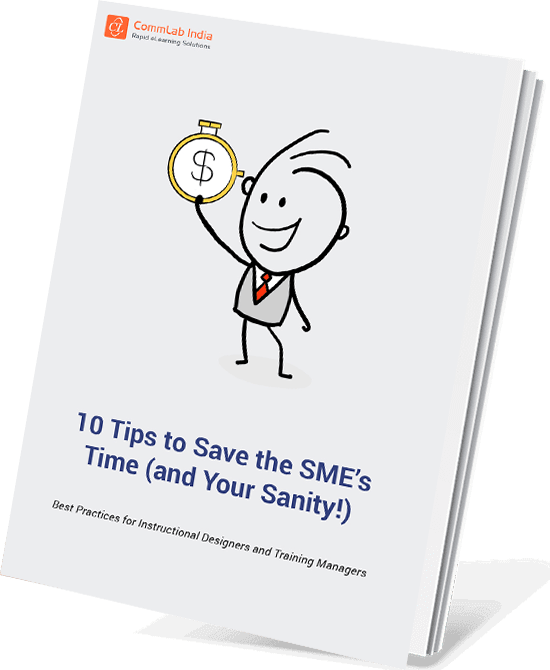5 Ways to Make Contributing to Custom eLearning Easy for Your SMEs

Creating effective corporate training programs is essential for any organization aiming to stay competitive in today’s fast-paced business environment. But with diverse learning needs and constantly evolving industry standards, how can you ensure your training is both relevant and impactful? This is where custom eLearning steals the show! It offers tailored solutions that address your unique organizational challenges. However, the success of custom eLearning hinges on the expertise and collaboration of Subject Matter Experts (SMEs).
Their deep knowledge and real-world experience are what transform generic content into powerful learning experiences that resonate with your team. In this blog, we’ll explore why SMEs are crucial in the development of custom eLearning, the challenges they face in this role, and practical strategies for L&D managers to support them effectively. By understanding and addressing these factors, you can make the most of your custom eLearning initiatives and ensure that they deliver maximum value to your organization. So are you ready? Let’s start!
→ Download Now: 10 Tips to Save the SME’s Time (and Your Sanity!)
Table of Contents
- What Is Custom eLearning?
- How Does Custom eLearning Benefit Corporate Training?
- What Is the Role of SMEs in Custom eLearning Development?
- What Are the Challenges Faced by Subject Matter Experts While Contributing to Custom eLearning?
- How Can L&D Managers Make It Easy for SMEs to Contribute to Custom eLearning?
What Is Custom eLearning?
Custom eLearning offers a personalized approach to online learning, designed to address the distinct requirements of an organization and its workforce. Unlike off-the shelf eLearning courses, custom content is developed from the ground up, taking into account the organization's specific goals, culture, and training objectives.
How Does Custom eLearning Benefit Corporate Training?
When it comes to the benefits of custom eLearning in corporate training, there are plenty! The wide range of benefits can significantly enhance your training initiatives. Let’s see how.
But first, here’s an overview of the benefits of custom eLearning in corporate training.

Now that you have an idea about the benefits, it’s time to dig deeper into each benefit.
1. Tailored Content for Your Unique Needs
Imagine having a training program that aligns perfectly with your organizational goals, culture, and the specific skills your employees need. It feels like it was designed specifically for your company. Well, the best part about custom eLearning is that the training program is designed for YOUR organization!
So whether you’re onboarding new hires or conducting training to upskill or reskill the current team, with custom eLearning solutions you can focus on the exact areas that matter most to your learners. It helps you ensure that every minute of training is relevant and impactful.
2. Flexibility and Accessibility
Just stop for a moment and think about how diverse your workforce might be. You might have got people working in different locations, possibly even different time zones! While traditional training methods stick to fixed schedules, custom eLearning is accessible anytime, anywhere. That’s right!
This aspect makes it really easy for the employees to engage with training courses at their own pace and on their schedule. Moreover, the flexibility offered by custom eLearning ensures that learning doesn't disrupt your business operations and easily fits into the busiest of workdays!
3. Cost-Effective Solution
Corporate training can be expensive! It can cost more than you might think. This is especially true when you weigh in the factors involved in offline Instructor-led Training (ILT).
.png?width=603&height=339&name=Cost%20Associated%20with%20Offline%20Instructor-Led%20Training%20(ILT).png)
Apart from these aspects, time away from the job often goes unaccounted for. But with custom eLearning, you don’t need to worry about all this. Custom eLearning content creation reduces these costs significantly. Once your custom eLearning course is developed, it can be used repeatedly without the need for additional resources.
What’s even more amazing is that you can update the training material easily as and when required. This helps you ensure that your training content stays relevant and up-to-date without the need for a complete overhaul. It’s a win-win as you can save both time and money.
4. Engaging and Interactive Learning Experience
Let’s face it, traditional training methods of corporate training can sometimes feel like a chore (sadly, an unending one!). But with custom eLearning, it doesn’t have to be that way. You can incorporate interactive elements like quizzes, simulations, scenarios, etc., to keep learners engaged and attentive. In fact, you can also leverage different multimedia elements to level up your custom eLearning courses.

This approach not only makes the learning experience more enjoyable but also helps in better retention of information. When your employees are actively participating rather than passively listening, they’re more likely to absorb and apply what they’ve learned.
5. Scalability for Growing Teams
As your company grows, so do your needs! And custom eLearning can help. It is easy to scale and allows you to accommodate more learners without compromising on the quality of the training. Whether you're onboarding a few new employees or rolling out new training to thousands, custom eLearning solutions can help you out. This scalability ensures that every employee, no matter when they join, receives consistent, high-quality training.
6. Measurable Results and Insights
Wouldn’t it be great to know exactly how effective your training is? With custom eLearning, you can track progress, assess performance, and gather data on your learners’ engagement. These insights allow you to make informed decisions about future training initiatives and tweak your current programs for even better outcomes. You’ll have a clear picture of what’s working and what needs improvement. It’ll help you maximize the training ROI.

10 Tips to Save the SME’s Time (and Your Sanity!)
Master the Art of Efficient Collaboration with your SMEs
- Understanding the SME’s World
- 10 Time-Saving Tips on:
- Planning and Preparation for Effective Collaboration
- Minimizing SME’s Effort
What Is the Role of SMEs in Custom eLearning Development?
You can be a jack of multiple trades, but when it comes to mastering, I’m sure it’ll be a few. Therefore, it’s quite possible that you might not have the required level of expertise or understanding about certain subjects that you need to create custom eLearning courses on. However, a thorough understanding and practical aspect of a subject topic is essential for creating high-value, engaging custom eLearning courses. This calls for a Subject Matter Expert (SME) in the custom eLearning development. They play a vital role in the creation of effective, engaging custom eLearning solutions. Here’s an overview of how SMEs contribute to effective custom eLearning.

Let’s take a closer look.
1. Ensuring Content Accuracy and Relevance
At the core of custom eLearning is the need for accurate and relevant content. SMEs bring their deep knowledge and expertise to the table, ensuring that the information presented is correct, up-to-date, and aligned with industry standards.
Without their input, custom eLearning content could miss critical details, leading to gaps in knowledge or even misinformation. SMEs also help ensure that learners are receiving the most accurate and applicable information possible. This is particularly important in fields where precision is key. Some of the industries that demand such kind of precision include healthcare, finance, manufacturing, and even technical industries.
2. Bridging the Gap Between Theory and Practice
SMEs are often professionals with real-world experience. The practical knowledge that SMEs bring to the table is invaluable in crafting impactful custom learning experiences. They can provide insights into how theoretical concepts are useful and can be applied in everyday situations. It makes the training more engaging, practical, and relevant to learners. The ability to bridge the gap between theory and practice enhances the learning experience, ensuring that learners not only understand the material but can also apply it effectively in their jobs.
3. Customizing Content to Fit Organizational Needs
One of the best things about custom eLearning is that it can be made to fit the needs of a particular organization perfectly. SMEs understand the unique challenges, processes, and goals of their organization. This helps them create training material that is directly relevant to the learners. This customization ensures that training is not generic but instead directly addresses the skills and knowledge employees need to succeed in their specific roles. All these elements align the training closely with the organization's business objectives.
4. Enhancing Learner Engagement
Infusing eLearning content with real-life examples, case studies, and scenarios from SMEs is an absolute game-changer! It makes the material more engaging and relatable for learners, and it's a win-win for everyone. SMEs can share their invaluable experiences, common challenges, and best practices that resonate with the learners, making the material more compelling and easier to understand. This level of engagement keeps the learners hooked and improves knowledge retention, leading to more effective training outcomes.
Want to learn more about learner engagement and how to enhance it in your custom eLearning courses? Check out the video below! (You can share it with your SMEs, too!)
5. Contributing to Credibility and Trust
Learners are more likely to trust and value content that is developed or endorsed by an expert in the field. SMEs lend credibility to the eLearning material. That’s right! Their involvement in custom eLearning development signals that the content is based on reliable, authoritative knowledge. This trust is crucial, especially when the training covers complex or critical topics where learners need confidence that what they are learning is both accurate and applicable.
6. Facilitating Continuous Improvement
There's no doubt about it that Subject Matter Experts (SMEs) are an invaluable part of the custom eLearning course development and improvement process. As industry standards evolve, new technologies emerge, and organizational needs shift. Keeping this view in mind, SMEs come in handy as they provide updates and insights that help keep the training content current and relevant. This continuous improvement process ensures that your custom eLearning solutions program remains effective over time, adapting to changes in the industry or the organization.
7. Supporting Compliance and Certification Requirements
In many industries, it's integral to make sure that everyone is up to speed with the latest regulations and certification requirements. SMEs are often the experts here, and they can make sure that the custom eLearning content covers all the bases. Their know-how helps to avoid any costly mistakes and makes sure that employees get the training they need to meet industry standards and keep their certifications.

10 Tips to Save the SME’s Time (and Your Sanity!)
Master the Art of Efficient Collaboration with your SMEs
- Understanding the SME’s World
- 10 Time-Saving Tips on:
- Planning and Preparation for Effective Collaboration
- Minimizing SME’s Effort
What Are the Challenges Faced by Subject Matter Experts While Contributing to Custom eLearning?
As we’ve seen, Subject Matter Experts (SMEs) play a crucial role in custom eLearning development. They help ensure that the training material is accurate, relevant, and valuable. However, this process isn’t without its challenges. Here’s a glimpse at some of the common hurdles SMEs might face while contributing to custom eLearning.
%20While%20Contributing%20to%20Custom%20eLearning.png?width=603&height=339&name=6%20Major%20Challenges%20Faced%20by%20Subject%20Matter%20Experts%20(SMEs)%20While%20Contributing%20to%20Custom%20eLearning.png)
Now that you have an idea about what these challenges look like, it’s time to dig deeper into each challenge.
1. Translating Expertise into Learner-Friendly Content
One of the biggest challenges for SMEs is taking their deep, often complex, knowledge and translating it into content that’s digestible for learners. What seems obvious to an expert can be overwhelming or confusing to someone less familiar with the subject. SMEs need to break down information into manageable pieces, avoid jargon, and present ideas in a way that’s engaging and easy to understand. Well, it might seem easy to read but it’s a task that’s easier said than done.
2. Balancing Detail with Simplicity
Did you know that SMEs often struggle with deciding how much detail to include in the custom eLearning content? While they want to ensure learners receive all the necessary information, there’s a risk of overwhelming them with too much detail.
Striking the right balance between providing comprehensive knowledge and keeping the content concise and focused is a constant challenge. It requires careful consideration of what’s essential versus what might be better left for more advanced training.

3. Time Constraints
In contrast to popular understanding, SMEs have full-time roles that demand a lot of their attention. Yes, that’s right! Along with their full-time responsibilities, contributing to custom eLearning projects can feel like an additional task. Therefore, finding the time to collaborate with instructional designers, review content, and provide feedback can be tough.
This challenge is compounded when there are tight deadlines, making it difficult for SMEs to give the custom eLearning courses the attention they need without compromising their other responsibilities.
4. Collaborating with Instructional Designers
While SMEs know their content inside out, instructional designers are experts in creating engaging learning experiences. However, this collaboration can sometimes be challenging due to differences in perspectives. SMEs might focus heavily on the content’s accuracy and depth, while instructional designers emphasize the learning experience and engagement. Finding a middle ground where the content is both accurate and learner-friendly requires ongoing communication and collaboration, which can be time-consuming and sometimes frustrating.
5. Adapting to eLearning Technologies
While experts in their domain, not all SMEs are familiar with the latest eLearning technologies. This can be a hurdle when contributing to custom eLearning. Your SMEs might need to learn new tools, understand how digital content is structured, or even rethink how the training material is presented in an online setting. This learning curve can be steep if they’re more accustomed to traditional training methods.
6. Maintaining Engagement and Motivation
Lastly, staying engaged and motivated throughout the custom eLearning development process can be a challenge. Creating custom eLearning courses often requires multiple rounds of revisions, testing, and feedback. The process can be lengthy, and without regular updates or clear milestones, SMEs might feel their efforts are not progressing as expected. This can lead to frustration or disengagement.

10 Tips to Save the SME’s Time (and Your Sanity!)
Master the Art of Efficient Collaboration with your SMEs
- Understanding the SME’s World
- 10 Time-Saving Tips on:
- Planning and Preparation for Effective Collaboration
- Minimizing SME’s Effort
How Can L&D Managers Make It Easy for SMEs to Contribute to Custom eLearning?
To ensure that Subject Matter Experts (SMEs) can contribute effectively to custom eLearning, you need to create an environment that supports and facilitates their involvement. Let’s check out some detailed and practical solutions to help your SMEs overcome the challenges they face.
Hey, L&D Managers! Want to Make Contributing to Custom eLearning Easy for Your SMEs?
Here’s what you can do:
- Provide Clear Guidance and Expectations
- Offer Content Structuring Support
- Allocate Dedicated Time for Collaboration
- Foster Strong Collaboration Between SMEs and Instructional Designers
- Provide Training on eLearning Tools and Best Practices
- Set Milestones and Celebrate Progress
- Streamline the Feedback Process
- Encourage Peer Support and Knowledge Sharing
Keep reading to know about each aspect in detail.
1. Provide Clear Guidance and Expectations
Start by clearly outlining what you expect from the SMEs. Provide them with a detailed brief that explains the scope of the project, the target audience, and the learning objectives. It’s also helpful to offer examples of what the final content should look like. It can include the level of detail required and the tone of voice. This guidance helps SMEs understand exactly what is needed and reduces the likelihood of them providing content that’s either too complex or too simplified.
2. Offer Content Structuring Support
To address the challenge of balancing detail with simplicity, you can provide SMEs with content templates or outlines. These resources can guide them in structuring their information in a way that is logical and easy for learners to follow. You can encourage them to focus on providing the key takeaways for each module.

Moreover, regular check-ins during the content creation process can help ensure that the training content remains learner-centric and effective.
3. Allocate Dedicated Time for Collaboration
SMEs often have limited time to contribute to custom eLearning programs. Therefore, it is highly recommended to plan your collaborations according to their work schedule. Based on their availability, allocate specific time slots for collaboration. Collaboration can take place in the form of weekly meetings, focused work sessions, calls, etc. A key aspect here is to be respectful of their other commitments.
Along with the abovementioned factors, it might also be helpful to break the custom eLearning development project into smaller tasks. It will allow SMEs to contribute in manageable increments. This approach prevents the process from feeling overwhelming and allows Subject Matter Experts (SMEs) to maintain their focus on both their primary role and the custom eLearning solutions.
4. Foster Strong Collaboration Between SMEs and Instructional Designers
You should actively facilitate the relationship between SMEs and instructional designers. Start by organizing an initial meeting where both parties can discuss their roles, expectations, and how they can best work together.
Once this is done, suggest regular communication between the two parties and make sure there’s a feedback loop in place. This comes in handy for addressing any issues quickly. You can also act as a mediator when necessary. It’ll help to bridge any gaps in understanding and ensure that both content accuracy and learner engagement are prioritized.

5. Provide Training on eLearning Authoring Tools and Best Practices
If SMEs are unfamiliar with the tools or technologies that your company is using for designing and developing custom eLearning solutions, it’s important that you offer them training or resources to get up to speed. It can include tutorials on the eLearning authoring tools being used, webinars on custom eLearning best practices, or even just a walkthrough of how their content will be transformed into a custom online course. The more comfortable SMEs are with the technology, the more effectively they can contribute. You can also consider assigning a tech-savvy team member to assist them with any technical challenges they face.
We’ve compiled a video on 7 best eLearning authoring tools to help you and your SMEs get started. Check it out now!
6. Set Milestones and Celebrate Progress
To keep SMEs motivated and engaged, break the project down into clear milestones. Celebrate each milestone achieved. The milestone can be something as simple as the completion of a module, a successful content review, feedback incorporation to more notable ones like launching of the custom eLearning course, improved training ROI, etc.
With that said, regularly updating SMEs on the project’s progress and how their contributions are making an impact can boost their morale and keep them invested in the outcome. Recognizing their efforts through shout-outs in meetings or small tokens of appreciation can also go a long way.h
7. Streamline the Feedback Process
Back and forth in the feedback process can be nerve-wracking! Therefore, make the feedback process a breeze for your SMEs. Give them a clear and structured process that's simple, easy to grasp, and time-efficient. To streamline the feedback process, you can use collaborative documents or project management software that helps centralize feedback.
These collaborative tools make it easier for SMEs to provide input and see comments and revisions in one place. This reduces the back-and-forth and ensures that all input is considered and incorporated smoothly. Lastly, if you are providing feedback to the SMEs, make sure that is specific and actionable. It will help SMEs know exactly what needs to be adjusted.
An important reminder here is to maintain a positive tone and mindset while sharing the feedback. Wondering why? Here’s a video to help you understand.
8. Encourage Peer Support and Knowledge Sharing
Sometimes, there's nothing more motivating and inspiring than hearing how your peers are tackling similar challenges head-on! Isn't it? Well, the same holds true for your SMEs too. Create opportunities for them to connect and share their experiences with other SMEs involved in the custom eLearning development process. This can be done through informal meetings, groups, or even an internal SME network. This peer support is a game-changer! It provides fresh perspectives, solutions to common problems, and a sense of community that makes the process less daunting.
With the help of the solutions suggested above, you can make the process of contributing to custom eLearning more manageable and rewarding for SMEs. This not only ensures high-quality content but also fosters a collaborative environment where SMEs feel supported and appreciated.
Summing It Up!
As we’ve seen, incorporating Subject Matter Experts (SMEs) into your custom eLearning solutions is not just beneficial, it’s essential. Their expertise ensures that your training content is accurate, relevant, and directly applicable to your team’s daily challenges. However, the journey of integrating SME knowledge into eLearning isn’t without its hurdles. By recognizing these challenges and implementing practical solutions, you can create a supportive environment that empowers SMEs to contribute effectively. It not only enhances the quality of your custom eLearning courses but also ensures that they align perfectly with your organizational goals. This results in better outcomes for both your employees and the organization. Want to learn more about saving SME time? Then our eBook given below is a must-read. Download now!




![How to Collaborate Effectively with Subject Matter Experts Through Rapid eLearning [Infographic]](https://blog.commlabindia.com/hubfs/Imported_Blog_Media/rapid-elearning-successful-collaboration-subject-matter-experts.png)
